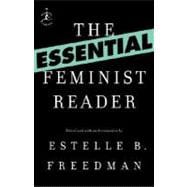
Note: Supplemental materials are not guaranteed with Rental or Used book purchases.
Purchase Benefits
What is included with this book?
| Introduction | p. xi |
| Documents | |
| The Book of the City of Ladies(France, 1405) | p. 3 |
| On the Equality of the Two Sexes(France, 1673) | p. 10 |
| “The Reply to Sor Philotea” (Mexico, 1691) | p. 15 |
| A Serious Proposal to the Ladies(England, 1694) | p. 20 |
| A Vindication of the Rights of Woman(England, 1792) | p. 24 |
| Flowers in the Mirror(China, c. 1800) | p. 37 |
| Letters on the Equality of the Sexes(United States, 1837) | p. 47 |
| “The Emancipation of Working Class Women” (France, 1843) | p. 52 |
| “Declaration of Sentiments and Resolutions” (United States, 1848) | p. 57 |
| Two Speeches (United States, 1851, 1867) | p. 63 |
| “The Enfranchisement of Women” (England, 1851) | p. 67 |
| The Subjection of Women(England, 1869) | p. 73 |
| “Social Purity” (United States, 1875) | p. 85 |
| The Doll’s House(Sweden, 1879) | p. 92 |
| “Daughters in Boxes” (Japan, 1883) | p. 99 |
| The Origin of the Family, Private Property, and the State(Germany, 1884) | p. 104 |
| “Equality of Rights” (Brazil, 1890) | p. 112 |
| A Voice from the South(United States, 1892) | p. 116 |
| “The Solitude of Self ” (United States, 1892) | p. 122 |
| “The Yellow Wallpaper” (United States, 1892) | p. 128 |
| The Liberation of Women(Egypt, 1899) | p. 145 |
| “Sultana’s Dream” (India, 1905) | p. 153 |
| Stones of the Jingwei Bird(China, 1905—07) | p. 165 |
| “The Tragedy of Woman’s Emancipation” (United States, 1906) | p. 168 |
| “The Social Basis of the Woman Question” (Russia, 1909) | p. 175 |
| three poems | |
| “Rise Up! To Woman” (United States, 1910) | |
| “The Day the Mountains Move” (Japan, 1911) | |
| “Bread and Roses” (United States, 1911) | |
| Mi opinión(Puerto Rico, 1911) | p. 186 |
| Suffrage Speech at Old Bailey (England, 1912) | p. 192 |
| Women’s International League for Peace and Freedom, Resolutions of the Zurich Conference (1919) | p. 199 |
| “The Damnation of Women” (United States, 1919) | p. 204 |
| Woman and the New Race(United States, 1920) | p. 211 |
| “East and West in Cooperation” (India, 1935) | p. 217 |
| Three Guineas(England, 1938) | p. 220 |
| Nation and Family(Sweden, 1941) | p. 231 |
| “Thoughts on March 8” (China, 1942) | p. 237 |
| Speeches at Arab Feminist Conference (Egypt, 1944) | p. 243 |
| “We Had Equality till Britain Came” (Nigeria, 1947) | p. 247 |
| The Second Sex(France, 1949) | p. 251 |
| Federation of South African Women, Women’ | |
| Table of Contents provided by Publisher. All Rights Reserved. |
The New copy of this book will include any supplemental materials advertised. Please check the title of the book to determine if it should include any access cards, study guides, lab manuals, CDs, etc.
The Used, Rental and eBook copies of this book are not guaranteed to include any supplemental materials. Typically, only the book itself is included. This is true even if the title states it includes any access cards, study guides, lab manuals, CDs, etc.
Excerpted from The Essential Feminist Reader
All rights reserved by the original copyright owners. Excerpts are provided for display purposes only and may not be reproduced, reprinted or distributed without the written permission of the publisher.